A recent teaming-up with Wonky Tofugu saw Koichi and I giving a special Edufire Superpass class on bizarre Katakana words in Japanese! It was such a success that we felt it wrong to deprive everyone who missed out, so here it is, in a special 2-part blog post split across Tofugu.com and Gakuranman.com!
 You won’t find any of the standard easy-to-learn katakana items here, (okay, maybe one or two, but those are just to get your feet wet) – I’ve stuffed it full of all annoying and perplexing terms that you may meet in your study of the Japanese language that give even the most complicated kanji a run for their money!
You won’t find any of the standard easy-to-learn katakana items here, (okay, maybe one or two, but those are just to get your feet wet) – I’ve stuffed it full of all annoying and perplexing terms that you may meet in your study of the Japanese language that give even the most complicated kanji a run for their money!
But first up, a special Gakuranman Greeting to all those readers who have flown in from Tofugu.com! If you haven’t already read it yet, get your sweet behind over to Tofugu.com – Strange Katakana Words now and read my guest post which is part 1 of this article.
**********
Rotten Fugu and Chibi-schoolboy. Gotta love the vintage style. You can achieve it too by going here: Wanokoto Old Photos
Alrighty. You should have seen the above slide already if you’ve read part 1 on Tofugu.com. We’re moving on to science and emphasis next!
Emphasising Science!
On the left are a few science-related terms and on the right are simple Japanese words that have been katakana-ised for emphatic value. I figured you probably didn’t want to read a whole list of medical terms, so I kept it trim ;).
ガン – Cancer. This is nearly always written in katakana, even though it has a kanji.
ラボ – A rabo? Not a ラブホ, right? No, that means love hotel. A rabo is a tiny abbreviation of laboratory!
エキス – an essense or extract of something. Essence of Tofugu? Wonder what that’d taste like..?
ヒフ科 – A skin doctor. The first two characters are written in katakana for simplicity.
マンネリ – Mannerism. Not strictly scientific, but related to the arts world. Also means ‘to be stuck in a rut’, like when things are boring in a relationship.
カワイイ – Cute!
カッコイイ – Cool!
ウルトラ – Ultra! Ultra Tofugu Chan!
ヤッタ – Hooray! Yes! I did it!
スッゴイ – Great!
When 2 become 1
Here’s an interesting list of words. All of them have had two words cemented together to form a longer one-word meaning in katakana.
サラリーマン – Salaryman (Salary + Man). You knew this one, right? Men who have sold their soul to work and earn money.
ダンプカー – A dump truck (Dump + Car). Hmm… Nothing interesting to say about this one…
ベビーカー – A pram. or push carriage? (Baby + Car) You people in America, what do you say?
ルームミラー – Rear-view Mirror (Room + Mirror). Fascinating. Why is a car rear-view mirror called a ‘room mirror’ Any ideas?
スキンシップ – Close Physical Contact (Skin + Ship). Perhaps something like skin + friendship? It describes the close emotional bond between mother and child by physical contact. Can also use it to describe situations where someone makes a lot of bodily contact with other people.
キーホルダー – Keyring (Key + Holder). Does what is says. Hold keys.
ショートカット – A short cut (Short + Cut). You’ve got it? What is it then? Not the blatantly obvious, that’s for sure. It makes to have a short hair cut.
バージョンアップ – Upgrade (Version Up). I like. When are we next gonna version up this darn system??
マンツーマン – One to One (Man + to + Man). A little outdated now? If we’re being all rosy and politically correct, we’d say ‘one-to-one’.
ナイスミドル – A handsome middle-aged man (Nice + Middle). Apparently when people are middle-aged they suddenly turn ugly. Not this guy, though.
Short and Sweet
Continuing with the amalgamation of words (oo, amalgamate…), we now have words combined and miniaturised. These are among the most difficult in Japanese because often unless you know the original two words, it’s very tricky to fathom what the slimmed-down versions are!
インフラ – Infrastructure. Nice and adult start to the list.
リストラ – Re-structure. Basically means for a company to be re-structured which is a euphemism for firing people in Japan.
パンチラ – A flash of white goodness (A.k.a flash of panties). Its use in fan-service heavy anime know no bounds.
ポケベル – A ‘pocket bell’. How retro. It refers to a pager!
マスコミ – Mass Communication. The mass-media and their deathly-grip on the minds of the people.
エアコン – Air Conditioning. Come to Japan. Learn why this inventor of this is a Saint.
パトカー – Patrol Car. …Back in ye olde days when bobbys used to patrol the streets of London… A police car that patrols. ‘Nuff said.
パンスト – Panty Stockings. Also known as tights, leggings, and numerous other terms.
ドンマイ – Don’t Mind! Oh yea! This word is IN right now. Somebody worried they might have upset you? Say ドンマイ,ドンマイ to them and reassure them that you’re fine and dandy.
パチスロ – Pachinko + Slot machines. A recipe for deafness, lung cancer and frugality.
Bizarre!
Alrighty! You’re doing well to have come this far! Just one more slide of juicy katakana morsels to go. And I’ve saved the best for last just for you people who read to the end ;)
ウインカー – A ‘winker’. Wink-wink-wink. That’ll be the car blinker lights then. Indicating to go right now…
カンニング – Oh, you’re so devilishly cunning Gakuranman. I am? No wait! I’m not, I’m not! Cunning means to cheat on a test. Gakuranman does not advocate.
バーター – A sidekick. My best translation to date, anyway. Used to refer to celebrities who appear on Japanese gameshows who are not important enough to be able to appear on their own and hence must come out on stage with somebody else. I discussed it in my recent post ‘Super Mario x Japanese Lesson‘.
デマ – A rumour. This one is a bit of a mystery to me. Why ‘dema’? Anyone know?
アラフォー – Around 40. Used recently to describe women who are middle aged, literally ‘around 40 years old’.
ネタ – Ooo. This tasty little word, and the inspiration for this whole topic! Neta means a popular news item or story that it likely to get people talking and interested. Not just newspapers and the media though – anyone can create a neta. But make sure it’s good!
エッチ – Ecchi. Everyone knows this, but often forgets just how odd it is. It means ‘H’ – possibly for ‘hentai’? Regardless, its meaning isn’t just simply ‘pervert’, it can be used to describe all manner of sexually-related things, like horny and naughty. I could go on but, y’know…
クラクション – A horn. Weird. Wonderful. Why??
ダビング – Dubbing. This was a ‘I created this presentation at 4am’ job. It means what it reads – to dub a television show with voiceovers.
マイカー – My Car. No really, it’s mine, not yours. The term マイ is tagged onto lots of words in Japanese to symbolise one’s personal something. Like ‘My Hole’ too. Curiosity killed the cat an all, but if you must know what ‘My Hole’ is, I wrote about it here: Love Doll Rental in Japan
メタボ – Metabolic Syndrome. A buzzword last year in Japan. People are worried they have a metabolism that is more likely to make them get fat.
セフレ – Sex Friend. Just in case, y’know, you are ever in that situation…
And that’s it people! Thanks for reading and especially to those who attended our class on Edufire. It was a lot of fun ^_^.
Do you have any comments about katakana and weird words?










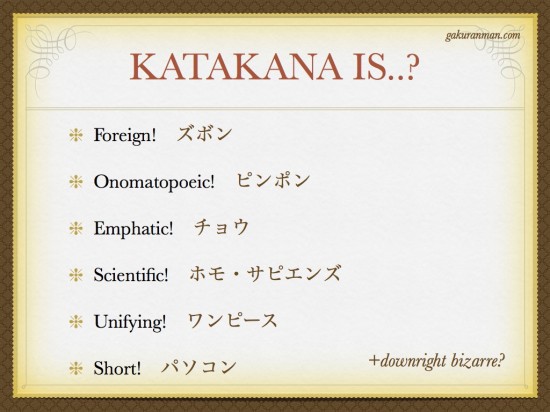
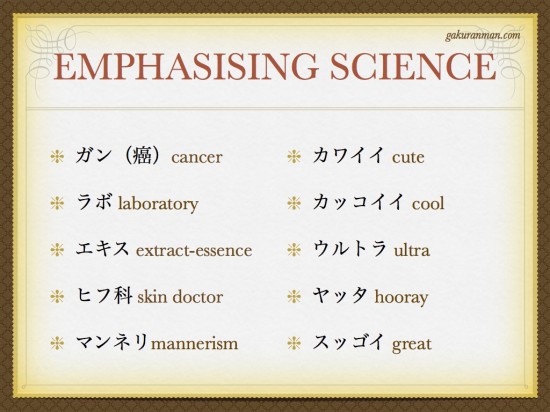
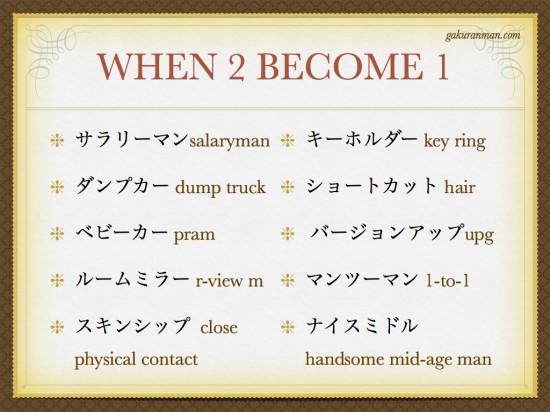
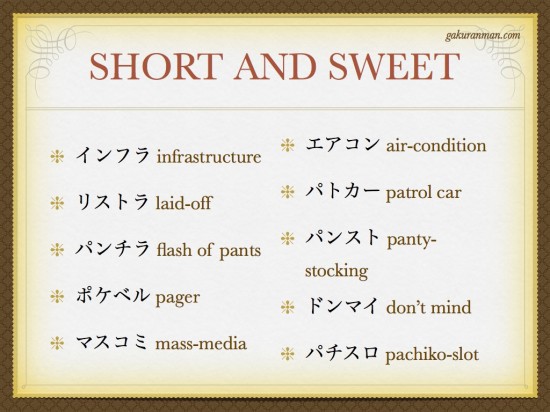
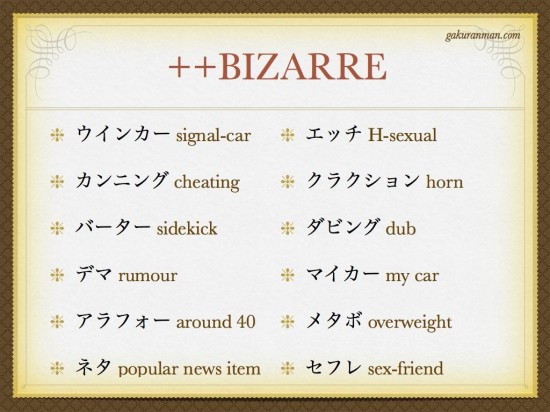
My favorite katakana word is アルプス . Suddenly the Japanese Alps becomes a four syllable word!
Thanks a lot ^^ Though I don’t know many words in your list, now I find Katakana very interesting. I really love to find the origin of Katakana.
My favorite one is シートベルト= shiitoberuto = seatbelt
Rear-view mirror is ‘Room mirror’ because they want to know how much room they have left when they are reversing into a spot. That’s what I think. I’m a Trinidadian Creole speaker and when I’m reversing I would sometimes ask someone to help me by saying “How much room I have back there?”
I know this post is almost a year old, but インフラ Comes from inflation, as in economic inflation.
NO it doesn’t. It comes from infrastructure.
Great example! Cheers :)
So another word that I thought was pretty interesting…
You know how us Americans got to Japan first and completely subverted the Japanese into calling 'football' as 'soccer'? Well, what we call football in the states is still called American Football in Japan – shortened to アメフト!
That's exactly it!
I heard this one a while ago too. A rather long while ago now, completely forgot it before I read this. I'd heard it came from skin+friendship but with a meaning more in a 100% non-homesexual male bonding context. Like, mates you'll hit the onsen with.
I'm also interested on this but I guess the basic understanding on Japanese language will be quite difficult for me.
Interesting to know.
Interesting to know.
The word “デマ” comes from “demagoguery(デマゴギー)”, as said in the wikipedia under the term “噂”. ;-)
Heya. Thanks for your comment :)
You're right about all those words except スキンシップ. The origin is skin + ship, according to the 大辞泉 digital dictionary, saying: 肌と肌の触れ合い。また、それによる心の交流.
SUKINSHIPU not “skin + ship” it's “suki + kinship” (“suki” is “to like/love” in Japanese)
DEMA is from “demagoguery” originally meaning to appeal to popular prejudice or say what they want to hear
KURAKUSHON is a Klaxon: the kind of mechanical horn that does the ahWOOOGA
NETA is the word for a tasty topping on sushi. in short: “tasty topic”
haha.
first time i heard ドンマイ i thought it was the greatest word in the world. ^_^
haha.
first time i heard ドンマイ i thought it was the greatest word in the world. ^_^
American for pram would be “baby buggy” (That’s totally a Clive Anderson vs American improvers conversation)
For shortened katakana fun, see if you can get your hands on some Abbreviation Train clips from the show Haneru no Tobira :)
And you just showed me this great Japanese show tonight! Thanks! Will definitely consider doing a follow-up post on more unusual katakana words! ^^
American for pram would be “baby buggy” (That’s totally a Clive Anderson vs American improvers conversation)
For shortened katakana fun, see if you can get your hands on some Abbreviation Train clips from the show Haneru no Tobira :)
And you just showed me this great Japanese show tonight! Thanks! Will definitely consider doing a follow-up post on more unusual katakana words! ^^
I was really surprised I knew most of these. But living in Japan makes learning slang a lot easier.
And yeah, Americans would call a pram a “stroller”.
Except my husband would say “エキス” a lot and I never knew what it meant… until now! Thanks!
Glad it helped! Thanks to you and everyone else about letting my know Americans call prams ‘strollers’. Haha :p
I was really surprised I knew most of these. But living in Japan makes learning slang a lot easier.
And yeah, Americans would call a pram a “stroller”.
Except my husband would say “エキス” a lot and I never knew what it meant… until now! Thanks!
Glad it helped! Thanks to you and everyone else about letting my know Americans call prams ‘strollers’. Haha :p
Loved the article. Katakana can be quite weird, can’t it?
shibuya probably already answered this, but I’m far too tired to get out my Japanese dictionary, so I’ll say it again. Klaxon is a genuine word meaning a car horn, it’s just not in use today. I know I found it so odd the first time I heard it, that I just had to look it up.
Loved the article. Katakana can be quite weird, can’t it?
shibuya probably already answered this, but I’m far too tired to get out my Japanese dictionary, so I’ll say it again. Klaxon is a genuine word meaning a car horn, it’s just not in use today. I know I found it so odd the first time I heard it, that I just had to look it up.
Hey there, thank you so much for posting this, it’s quite useful!
Just wanted to point where I think some of the words are from – as a Belgian I speak French and have seen quite a few French words pop in katakana. That’s where ”クラクション” comes from – the French word for car horn is “klaxon.” On the previous page at Tofugu I also noticed “pierrot” (ピエロ) which is a type of French clown. (You know those white clown with black makeup, round hats, and usually frilly clothes? ex: http://www.cesam-international.com/images/William%20Pierrot.jpg) I also think words like “ピーマン” (“piment” is the French word for a pepper), and I probably missed a few from this lesson, are all from フランス語!
Hope that can help in some way, and again thank you so much for taking the time post this lesson!!
Thanks for the info Okapi, and taking the time to comment ^^. Piero is an odd word for me to hear, but it’s cool how we can indirectly learn about other cultures through Japanese Katakana :)
Hey there, thank you so much for posting this, it’s quite useful!
Just wanted to point where I think some of the words are from – as a Belgian I speak French and have seen quite a few French words pop in katakana. That’s where ”クラクション” comes from – the French word for car horn is “klaxon.” On the previous page at Tofugu I also noticed “pierrot” (ピエロ) which is a type of French clown. (You know those white clown with black makeup, round hats, and usually frilly clothes? ex: http://www.cesam-international.com/images/William%20Pierrot.jpg) I also think words like “ピーマン” (“piment” is the French word for a pepper), and I probably missed a few from this lesson, are all from フランス語!
Hope that can help in some way, and again thank you so much for taking the time post this lesson!!
Thanks for the info Okapi, and taking the time to comment ^^. Piero is an odd word for me to hear, but it’s cool how we can indirectly learn about other cultures through Japanese Katakana :)
I’ve heard somewhere that ネタ is タネ (種) reversed, but is it true?…
Thanks for the great article! :D
I’ve heard somewhere that ネタ is タネ (種) reversed, but is it true?…
Thanks for the great article! :D
“Apparently when people are middle-aged they suddenly turn ugly. Not this guy, though.”
LOL <333
Yea, I had no idea what a pram was. I think we say stroller?
And I love ドンマイ
Thanks for the article!
“Apparently when people are middle-aged they suddenly turn ugly. Not this guy, though.”
LOL <333
Yea, I had no idea what a pram was. I think we say stroller?
And I love ドンマイ
Thanks for the article!
A ベビーカー would be known as a stroller in the States :D
And did you know that ネタ actually comes from 種? It’s just spelled backwards!
Yes! I neglected to put the note about ネタ coming from 種 in the post, but I had heard so before! ^^
A ベビーカー would be known as a stroller in the States :D
And did you know that ネタ actually comes from 種? It’s just spelled backwards!
Yes! I neglected to put the note about ネタ coming from 種 in the post, but I had heard so before! ^^
“We” people in America say stroller. :)
(this pertains to the ベビーカー thing)
“We” people in America say stroller. :)
(this pertains to the ベビーカー thing)
We call our baby cars “strollers” in america :D
thanks for the cool post!
We call our baby cars “strollers” in america :D
thanks for the cool post!
for デマ you can try looking up the following
Demagogie デマゴギー, (German)
became popular many years ago
for クラクション horn, try wikipedia where it says
自動車では「クラクション(フランスの自動車部品メーカー・クラクソン(en:Klaxon)の製品が有名だった為に語源となったといわれる)」やホーン(Horn)と呼ぶ物を指し、船舶は霧笛(むてき)、鉄道車両のうち蒸気機関車を中心に汽笛(きてき)とも称する。
Thanks for the informative explanation Shibuya! Was interesting to read that クラクション came from a French car maker!
for デマ you can try looking up the following
Demagogie デマゴギー, (German)
became popular many years ago
for クラクション horn, try wikipedia where it says
自動車では「クラクション(フランスの自動車部品メーカー・クラクソン(en:Klaxon)の製品が有名だった為に語源となったといわれる)」やホーン(Horn)と呼ぶ物を指し、船舶は霧笛(むてき)、鉄道車両のうち蒸気機関車を中心に汽笛(きてき)とも称する。
Thanks for the informative explanation Shibuya! Was interesting to read that クラクション came from a French car maker!